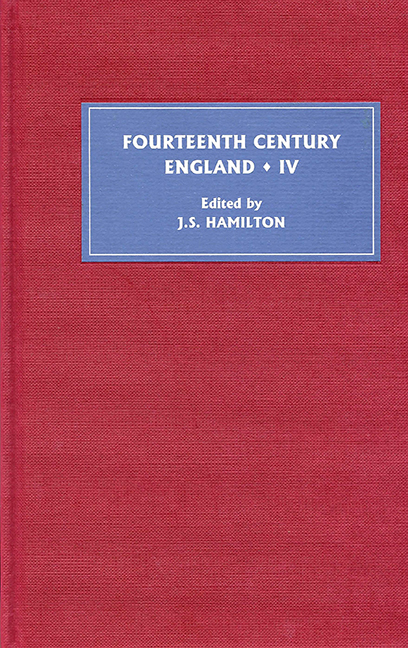Book contents
- Frontmatter
- Contents
- List of Illustrations
- Contributors
- Preface
- Abbreviations
- Who was St Thomas of Lancaster? New Manuscript Evidence
- ‘Hedging, Ditching and Other Improper Occupations’: Royal Landscapes and their Meaning under Edward II and Edward III
- Paying for the Wedding: Edward III as Fundraiser, 1332–3
- The Politics of Privilege: Thomas Hatfield and the Palatinate of Durham, 1345–81
- Agnes Maltravers (d. 1375) and her Husband John (d. 1364): Rebel Wives, Separate Lives, and Conjugal Visits in Later Medieval England
- Gendering Pastoral Care: John Mirk and his Instructions for Parish Priests
- Prosecution of the Statutes of Provisors and Premunire in the King's Bench, 1377–1394
- ‘Mercy and Truth Preserve the King’: Richard II's Use of the Royal Pardon in 1397 and 1398
- Aliens in the Pardons of Richard II
- ‘Too Flattering Sweet to be Substantial’? The Last Months of Thomas, Lord Despenser
- ‘O Prince, Desyre to be Honourable’: The Deposition of Richard II and Mirrors for Princes
- Regional Politics, Landed Society and the Coal Industry in North-East England, 1350–1430
Regional Politics, Landed Society and the Coal Industry in North-East England, 1350–1430
Published online by Cambridge University Press: 12 September 2017
- Frontmatter
- Contents
- List of Illustrations
- Contributors
- Preface
- Abbreviations
- Who was St Thomas of Lancaster? New Manuscript Evidence
- ‘Hedging, Ditching and Other Improper Occupations’: Royal Landscapes and their Meaning under Edward II and Edward III
- Paying for the Wedding: Edward III as Fundraiser, 1332–3
- The Politics of Privilege: Thomas Hatfield and the Palatinate of Durham, 1345–81
- Agnes Maltravers (d. 1375) and her Husband John (d. 1364): Rebel Wives, Separate Lives, and Conjugal Visits in Later Medieval England
- Gendering Pastoral Care: John Mirk and his Instructions for Parish Priests
- Prosecution of the Statutes of Provisors and Premunire in the King's Bench, 1377–1394
- ‘Mercy and Truth Preserve the King’: Richard II's Use of the Royal Pardon in 1397 and 1398
- Aliens in the Pardons of Richard II
- ‘Too Flattering Sweet to be Substantial’? The Last Months of Thomas, Lord Despenser
- ‘O Prince, Desyre to be Honourable’: The Deposition of Richard II and Mirrors for Princes
- Regional Politics, Landed Society and the Coal Industry in North-East England, 1350–1430
Summary
Over the years, historians of the late-medieval English gentry have mapped out several working models to explain the character and behavior of landed society in various localities around the country. While various, two basic models have nonetheless emerged which have served to define the parameters of the debate. On the one hand, some have argued that gentry life was usually dominated by the presence and operation of great aristocratic affinities, which often became stages for the drama of competition between gentry families, and which thereby preoccupied gentry families; they were often left scrambling for fortune and preferment within one or another of the great retinues of the country's increasingly influential baronial families. This view has been challenged by another model for the operation of local landed communities, one which posits a more cohesive, even co-operative, situation in which members of a landed community occasionally put aside mutual antagonisms, instead speaking with a collective voice on matters of local importance. Although they have generally provided the framework for the study of regional landed society, historians in recent years have begun to cast their net beyond these two basic constructions. For example, space has now been made for more significant regional variation, based upon a series of local variables, including but not limited to such factors as a region's geography, its land tenure arrangements, its relative wealth, the presence of one or more great families, royal influence, and the relative ease of financial and/or political advancement. It is upon this final point that this essay will turn, for one such financial variable – the coal industry – was a clear factor in determining the political and financial climate of Northeast England by the latter part of the fourteenth century; it will serve here as a convenient prism as we seek to place the region's gentry within its political economy. Because of the often scant nature of evidence available for certain periods, strong conclusions may have to remain somewhat elusive, but the gathering of this evidence will surely prove useful in suggesting certain avenues of future investigation.
- Type
- Chapter
- Information
- Fourteenth Century England IV , pp. 175 - 191Publisher: Boydell & BrewerPrint publication year: 2006

